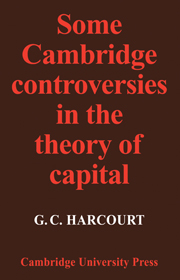Book contents
- Frontmatter
- Contents
- Preface
- Introduction
- 1 Search for a will-o'-the-wisp: capital as a unit independent of distribution and prices
- 2 Treacle, fossils and technical progress
- 3 Solow on the rate of return: tease and counter-tease Preliminaries to the main bout
- 4 A child's guide to the double-switching debate
- 5 The rate of profits in capitalist society: whose finest hour?
- References
- Index
1 - Search for a will-o'-the-wisp: capital as a unit independent of distribution and prices
Published online by Cambridge University Press: 11 January 2010
- Frontmatter
- Contents
- Preface
- Introduction
- 1 Search for a will-o'-the-wisp: capital as a unit independent of distribution and prices
- 2 Treacle, fossils and technical progress
- 3 Solow on the rate of return: tease and counter-tease Preliminaries to the main bout
- 4 A child's guide to the double-switching debate
- 5 The rate of profits in capitalist society: whose finest hour?
- References
- Index
Summary
Square one
To begin at the beginning. In 1953 Joan Robinson wrote ‘The Production Function and the Theory of Capital’ (Robinson [1953–4]) in which she made a number of specific complaints about the state of economic theory and the state of some economic theorists, who soon were to become identified as the latter-day neoclassical whose H.Q. is now Cambridge, Mass. Her complaints related to the ambiguity concerning the unit in which capital was measured in the neoclassical aggregate production function, the concentration on factor proportions and the neglect of factor supplies and technical progress in the explanation of distributive prices and shares, and what she saw as the deficiencies of the neoclassical definition of equilibrium. In her article, though, Joan Robinson did not specifically name the economists that she had in mind and some of those who subsequently stood up to be counted, including Samuelson and Solow, had not yet published papers on these particular topics. Stigler had, though (see Stigler [1941], especially chapter XII), and the implicit standard against which he measures the performances of the great neoclassical economists whom he discusses is a case-book example of the neoclassical economist of Joan Robinson's article.
The response to her article was many articles (some sympathetic, some critical), a number of books, including four of her own, Robinson [1956, 1960, 1962a, 1971], and several new strands of economic analysis and econometric investigation.
- Type
- Chapter
- Information
- Some Cambridge Controversies in the Theory of Capital , pp. 11 - 46Publisher: Cambridge University PressPrint publication year: 1972



